
Is residential rehab treatment right for you? Do things appear to be getting out of hand after returning from the battlefield? Do you get a feeling something isn’t quite right with your mental health? Behavioral health illnesses have a tendency to fog things up, so you may not realize you’re acting differently until friends or loved ones point it out. You may be familiar with inpatient hospitalization programs, but there is also a non-inpatient option. Heroes’ Mile offers residential rehab treatment that may be appropriate for people in need of mental or behavioral health therapy, as well as detox and addiction treatment.


Table of Contents
How Do I Know if I Need Partial or Full Hospitalization
Veterans’ Partial Hospitalization Program
For a non-residential drug and alcohol treatment program, the partial hospitalization program (PHP), is available. Clients travel to and from the treatment center, spending up to five hours each day on-site. PHP helps soldiers maintain their sobriety while still letting them to return home in the evenings. It also offers a planned amount of assistance while the Veteran adjusts to a more independent lifestyle.
When a Veteran enrolls in our PHP program, he or she may anticipate participating in individual, group, and family counseling sessions. Our services are monitored by mental health specialists, addiction recovery experts, and/or physicians throughout all treatment modalities to guarantee that the military members in our care receive complete care.
Residential Drug and Alcohol Rehab for Veterans
The 12-step addiction treatment method is followed in the residential recovery program for Veterans. In addition, our inpatient residential treatment for veterans offers a secure environment in which to lay the groundwork for a long-term recovery. The length of the program, for example, will be determined by the individual’s treatment plan.
Veterans will be monitored 24 hours a day, seven days a week while in residential therapy. Veterans will be housed in our peaceful villa in beautiful Florida. They may also be able to take advantage of a range of treatment alternatives for addiction and psychiatric care for PTS, MTS, and other military-related mental health concerns.
The following are included in the residential rehab treatment:
- Individual therapy
- Group therapy
- Art therapy
- Family members’ counselling
- Eye movement desensitization and reprocessing (EMDR) therapy
- Cognitive behavioral therapy
- Recreational activities
- Spiritual therapy
- Food plan and nutritional evaluation
- Job readiness, preparation and training
Alternative Treatment Options
Outpatient
Individual therapy, group therapy, and support groups are examples of services or treatment methods available in outpatient settings. A community mental health hospital or a private clinic may provide these services.
Intensive Outpatient Programs (IOPs)
The patient goes on a less regular basis for a shorter period of time, often three times per week for a few hours, comparable to partial hospitalization programs.
IOPs are largely focused on mental health and/or drug misuse disorders, and they may be helpful for someone who need more assistance than is provided in outpatient settings.
Hospitalization
Hospitalization is for people who require round-the-clock care and access to a physician. Those who require mental stabilization or are at danger of injuring themselves or others are frequently admitted to hospitals.
Hospitalization is utilized in “crisis” situations to help the patient get back on their feet, which usually occurs within a few days.
Why Is Residential Treatment Necessary?
Trying to figure out which treatment option is best for you might be difficult with so many various levels of care and programs available around the country. Despite the fact that people seek residential therapy for a variety of reasons, there are several challenges that virtually always necessitate this degree of care, such as:
- Mental Illnesses with Severe Consequences
- Anorexia nervosa
- Addiction
What Are the Benefits of Residential Treatment?
In some manner, each residential treatment program is distinct from the others. Regardless of the changes, there are several underlying characteristics that contribute to why residential is highly effective in general.
Support Is Available Around the Clock
In comparison to other levels of care, all residential treatment clinics provide constant monitoring and 24/7 available assistance.
While it may feel like an invasion of privacy at times, this continual assistance and monitoring aids in tracking patient progress, identifying areas of difficulty, and preventing relapse.
Distance
From the patient’s prior existence getting some distance from one’s current circumstances, such as from triggering, creeping memories, and so on, can assist with discernment and perspective, as well as being among healthy people.
Various Treatment Techniques
Residential treatment programs, unlike many outpatient facilities, would often provide a variety of therapeutic intervention techniques in addition to the standard “talk therapy.”


What to Look for in a Residential Treatment Facility
Rehabilitation Aftercare Plan
Discharge planning normally takes place immediately after admission, however there are certain exceptions depending on the patient. This is when the patient’s treatment team and the patient talk about the patient’s care after they leave the residential treatment center.
Emergency Medical Services
A reputable residential treatment center will have contacts with nearby hospitals and/or urgent care centers. Whether a patient has an accident, self-harms, or is in crisis and need more assistance, it is critical that the treatment facility has these services on hand.
Licensure or Accreditation
Each state has its own mental health treatment facility licensure regulations, and while the conditions for licensure may differ significantly, every residential treatment center is needed to be licensed.
Credentialed Personnel
Not only does a residential treatment center need suitably qualified and licensed employees, but it also needs a sufficient quantity of workers.
The number of patients might fluctuate, since some patients may be admitted while others are discharged on any given day. As a result, depending on the maximum capacity of the treatment facility, there must be enough staff to appropriately assist any number of patients.


Are You Looking for Residential Rehab Treatment?
Heroes’ Mile offers a residential treatment and partial hospitalization program for Veterans. If you or someone you know suffers from severe mental health or co-occurring substance abuse disorders, it’s important to find the right help.
Heroes’ Mile is a drug abuse treatment facility for Veterans who are struggling with addiction or other psychiatric issues as a result of their military service. Our recovery center, which is in DeLand, FL, specializes in treating typical concerns that military members experience.
Please contact one of our admissions consultants now at 386-400-2993.
The post Do I Need Partial or Full Hospitalization appeared first on Heroes’ Mile Veterans Recovery Center.
Source
Original Author: Cody Cox

